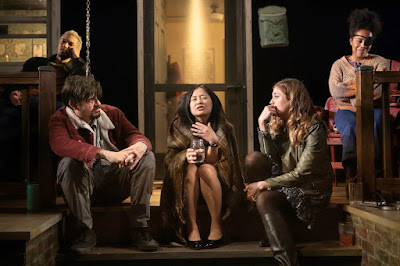Playwright Branden Jacobs-Jenkins and I go back a long way. I saw his first New York show down at P.S. 122 right after its director quit during previews and one of the actors published a piece in The Village Voice calling the play “a piece of crap.” Jacobs-Jenkins had to rally the remaining cast and direct the show himself, which didn’t go so well (click here to read more about that).
But four years later in 2014, An Octoroon, that same riff on an old Dion Boucicault melodrama, got a second chance at Soho Rep, where it was brilliantly staged and helped put the playwright on the theatrical map for his bodacious use of conventional tropes to explore uncomfortable truths about race, gender and class (click here to read my review of that one).
I've been eagerly following Jacobs-Jenkins ever since and cheering most of the work (Appropriate, Everybody, Gloria) that he's done. Until now. The Comeuppance, his rumination on the mid-life disappointments of the Millennial Generation that opened this week at Signature Theatre, disappointed me.
The play is centered around the 20th reunion of a group of high school friends. They’re a multi-racial bunch (back in the day, they called themselves “Merge,” a homonym acronym for “Multi-Ethnic Reject Group”) and they dated one another and took pride in being the smartest kids at their Catholic school. But, of course, over the years their lives have gone down different paths.
Emilio is an expat artist whose work has been selected for the Whitney Biennial but who’s a bit mysterious about his family back in Berlin. His former girlfriend Kristina is now a doctor and a mother of five but a not-so-secret alcoholic. Their friend Ursula is barely scraping by and dealing with an aggressive form of diabetes that has blinded her in one eye.
Meanwhile Caitlin, once the smartest of the crew, is now a stay-at-home wife married to an ex-cop and Trump supporter; and her old beau Paco is a vet struggling with severe PTSD after multiple tours in the Middle East. A sixth member who calls in to say he can’t make it to the gathering seems to be a finance bro.
Himself 38, Jacobs-Jenkins clearly wants to say something profound about how living through such ordeals as the Columbine High School massacre, the 9/11 attacks, the interminable wars that followed, the Great Recession, the rise of Trumpism and the Covid pandemic have affected his generation. But he doesn't seem to know what more to say about those calamities than that they happened. And that they messed people up. That seems to have been enough for some critics (The Comeuppance is a New York Times Critics Pick). But I was left wanting something more.
Jacobs-Jenkins seems aware of the shortfall and he tries to draw some conclusions in wordy but vague speeches at the end of the play. There's also been online chatter about his revising the script substantially during previews. I can't confirm that but I find it believable because actors stumbled repeatedly over lines at the performance I saw a few days before the show opened.
And these aren’t the kind of actors who flub lines. In fact, the cast is stacked with such talented performers—Caleb Eberhardt, Brittany Bradford, Susannah Flood, Shannon Tyo, and Bobby Moreno—that it’s almost as though the casting notice read “Only the most excellent young actors working in New York need apply.”
They are funny and touching and, Moreno in particular is called on to give an intensely physical performance. So it’s easy at first to hang out with them. But the show runs for nearly two-and-a-half hours without intermission and since none of their characters really change, they eventually wore out their welcome with me.
In an apparent effort to give some gravitas to the play, Death has been added as an additional player and speaks directly to the audience in the voices of each of the five onstage characters. We’re clued in that Death has taken over one of them when the lights flicker and that actor's voice is filtered through a synthesizer that often makes it difficult to understand what's being said.
All of the action takes place on the front porch of Ursula’s modest home where the group has gathered for a pre-party before heading off for the larger class reunion, even though some dialog indicates that it’s chilly outside.
Director Eric Ting does what he can to move the actors around the small space as their characters reminisce, get high and try to settle old disputes or rekindle old romances. But I couldn’t figure out why Jacobs-Jenkins had placed them out there in the first place.
Maybe the setting is supposed to be some kind of metaphor for the characters—and all of us—being on Death’s doorstep. I've come too far with Jacobs-Jenkins and he's too gifted a playwright for me to abandon him but I can't help thinking that The Comeuppance owes us more than that.
